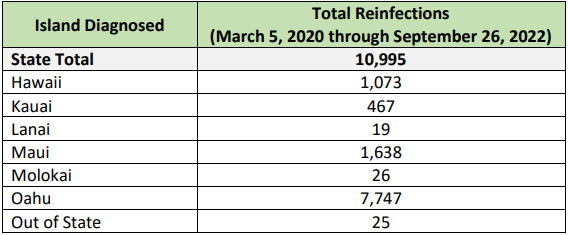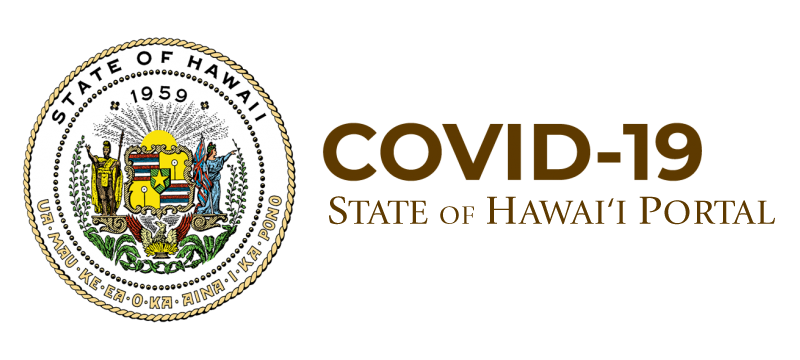Since the emergence of the Omicron variant in Hawai‘i, a greater percentage of COVID-19 cases involve people who have been infected multiple times.
On Wednesday, the Hawai‘i Department of Health (DOH) added 10,995 reinfections to the total number of COVID-19 cases on its Disease Outbreak and Control Division (DOCD) data dashboard. These cases date back to September 2020 when the first known reinfection was recorded.

Prior to Wednesday, case counts on the dashboard displayed the number of unique individuals whose positive tests had been reported to DOH. People who tested positive multiple times were counted just once.
“The data on reinfections underscores what we have been saying; that limited immunity from previous infection only lasts so long. Regardless of whether a person has had COVID-19 in the past, they should stay up to date on their vaccinations and boosters to get increased protection from severe illness and hospitalization,” said State Epidemiologist Dr. Sarah Kemble.
For more information, read the DOH Reinfection Report.
What is a Reinfection?
According to the U.S. Centers for Disease Control and Prevention (CDC), reinfection means a person was infected with COVID-19, recovered, and then became infected again.
“There was only a small percentage of reinfections happening early in the pandemic,” said DOH epidemiologist David Johnston. “But as time passes and as new variants are introduced, the risk of reinfection increases.”
Reinfections will be included on the dashboard when a person tests positive for COVID-19 more than 90 days after a previous positive test.
DOH will update the reinfection data on a weekly basis.
Risks from COVID-19 Reinfection

Every individual infection and reinfection has the potential to develop into long COVID.
According to the CDC, long COVID involves a wide range of new, returning, or ongoing health problems that continue for months, sometimes years, after initial infection.
People with long COVID often experience fatigue, joint pain, and difficulty breathing among other symptoms.
“Initial data shows that up to a third of people who had a severe case of COVID infection that required hospitalization will present with long COVID symptoms that can last for months if not longer,” said Kaua‘i Medical Center pediatrician Dr. Bob Wotring, who is also chief of Community Pediatrics for Hawai‘i Pacific Health.
The CDC says studies are currently underway to help determine how often reinfections happen, who is at higher risk, and the severity of reinfections compared with initial infections.
Bivalent Boosters Offer Extra Protection Against COVID-19
Bivalent booster vaccines are designed specifically to protect against both original COVID-19 and Omicron subvariants BA.4 and BA.5.
The BA.5 subvariant currently accounts for approximately 92% of the COVID-19 cases in Hawai‘i. The BA.4 subvariant accounts for an additional 4%.
The CDC and DOH recommend the bivalent booster manufactured by Pfizer-BioNTech for people age 12 and older and the bivalent booster by Moderna for adults age 18 and older.
Bivalent vaccines are administered as a single booster dose to those who previously completed a primary series of COVID-19 vaccines and those who have had one or two booster doses. It can only be administered if it has been at least two months since a person’s most recent vaccination.
Booster appointments are scheduled by individual vaccine providers. Find information about providers and the services they offer by visiting vaccines.gov or the vaccine finder map at HawaiiCOVID19.com/vaccine.
Denby Fawcett: Why So Few People Are Getting The New Covid Shot
Experts are worried about the lack of interest as people are still suffering from the virus and long Covid. By Denby Fawcett Original article on Civil Beat, November 7, 2023 I keep a card in my [...]
Federal Public Health Emergency (PHE) for COVID-19 ends on May 11, 2023
HONOLULU, HI –The federal Public Health Emergency (PHE) for COVID-19, declared under Section 319 of the Public Health Service Act, will expire at the end of the day on May 11, 2023. As the PHE [...]
Seniors now eligible for additional COVID-19 bivalent booster dose, COVID vaccine recommendations simplified
HONOLULU, HI – The Hawai‘i Department of Health (DOH) supports the latest recommendations announced yesterday by the Centers for Disease Control and Prevention (CDC), allowing an additional dose of the bivalent booster against the virus [...]
Hawai‘i COVID-19 hospitalizations on the rise
HONOLULU, HI – The Hawai‘i Department of Health (DOH) reports a rise in the rate of COVID-19 hospitalizations. The number of total positive COVID-19 hospitalizations has increased over the past week (3/26 – 4/4) from [...]
Wastewater Samples Show Higher COVID Concentrations & New Subvariant
The Hawai‘i State Department of Health’s most recent Wastewater Surveillance Report documents two significant developments about COVID-19 in Hawai‛i. Higher concentrations of the virus that causes COVID-19 The arrival of the XBB.1.5 subvariant Higher concentrations [...]
Bivalent boosters for keiki as young as 6 months
Updated COVID-19 bivalent boosters are now available in all counties for keiki as young as six months of age. The U.S. Food and Drug Administration (FDA) amended the emergency use authorization for the bivalent boosters [...]
